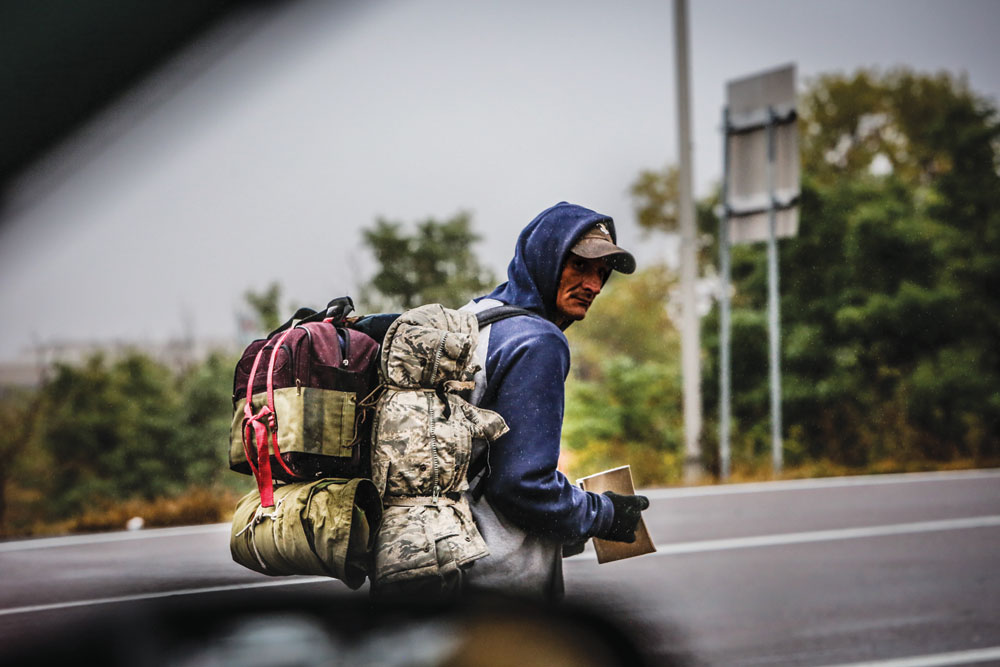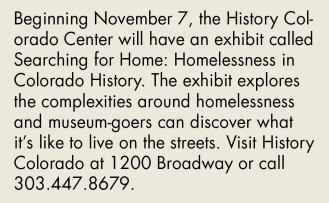
The I-270 off-ramp at Quebec is a common spot for panhandlers. Denver Police Department homeless outreach officers help connect these individuals with the right services to help them get off the streets.
A homeless person is sitting on a bench outside of a business. A homeless person is sleeping in the park. A homeless person is walking laps around Wal-Mart. These are all reasons to call the police, right? Not necessarily.
“Being homeless is not illegal and being crazy is not illegal,” says Robert Parks, homeless outreach officer for the Denver Police Department. This is one of the first things he tells people when he gives educational talks about homelessness.
According to Parks, most of the time homeless people are not doing anything illegal, but residents want them removed. But just like any other citizen, homeless people do have rights and cannot be removed from public spaces for no reason. “If there is an immediate crime and something we can stop, we do that. But a lot of the time, we get into the complexities raised by homelessness,” Parks says. If officers wanted, they could follow one homeless person around all day and most likely write citations for public urination, violation of the camping ordinance, and open container, but that only gives the homeless person a list of court dates and fines.
Homeless outreach officers have tricky jobs because the goal of the officer is oftentimes different than the goal of the person who called in. Officers very rarely receive calls concerned about homeless people. Most of the calls are to have a homeless person removed. “Most important to remember is that Denver is a city that values all people and as a city, we want to do all we can to help move people from a life on the streets to stability, including connecting them to appropriate services to help them embark on that transition,” says Jesse Granger with the Department of Human Services. “We firmly believe that the safest place for those experiencing homelessness is indoors. People are better served when they are sheltered and ultimately housed because without stability, it is difficult to achieve self-sufficiency.”
The homeless outreach unit’s goal is to help further the process of getting people off the streets. The unit was formed in 2007 and serves the entire Denver metro area. It consists of four people. Most cities do not have these units. There is a need, but no funding for a special unit. Plus, many officers are not drawn to this type of work.
While these officers do police work, a majority of their time is spent doing social work. Homeless outreach officers are mediators between the homeless community and residents, business owners, or whoever calls the police. They are on call as consultants for patrol officers dealing with homeless issues and can come to a scene. They also respond to calls from 911 and 311 (Denver city services).
The officers know every homeless community around Denver, as well as the individuals within those communities. The officers connect them with the right services, including the best places for medical care, food, shelter, drug addiction rehabilitation, long-term care, and more.
“The connotation of homeless does not capture the broad spectrum of what it means to be homeless,” Robert Parks says. There are three main types of homelessness: economic, situational and chronic. The economically homeless person is often undereducated, lives paycheck to paycheck, and his or her skill is no longer needed. The situationally homeless person gets into a situation that drives him or her to the streets, like a woman who is beaten and decides to leave with only $50 that doesn’t get her very far. The chronically homeless person is often addicted, sleeps in alleys and doesn’t want to get off the streets. Most often, people cannot pick out the economic or situational homeless person, but know and think of the chronic homeless person. These chronically homeless people are the ones the homeless outreach officers spend most of their time working with. Unfortunately, the chronically homeless people oftentimes don’t want to get off the street and may deny help from the police.
 Every morning the homeless outreach officers do a wake-up call for the chronically homeless population downtown. Within the business improvement district downtown, there is a sit-lie ordinance that restricts people from sitting or sleeping from 7am to 9pm. The officers wake up the people and get them moving so people do not call the police on them later in the morning. As winter approaches, these homeless people will move inside to stairwells, ATM vestibules, and lobbies, becoming more visible to the public.
Every morning the homeless outreach officers do a wake-up call for the chronically homeless population downtown. Within the business improvement district downtown, there is a sit-lie ordinance that restricts people from sitting or sleeping from 7am to 9pm. The officers wake up the people and get them moving so people do not call the police on them later in the morning. As winter approaches, these homeless people will move inside to stairwells, ATM vestibules, and lobbies, becoming more visible to the public.
Parks believes his unit cannot solve the homeless problem and it will persist, especially as Denver continues to grow, but they are an essential part of getting homeless people the services they need to get off the streets and not be a nuisance for residents and business owners.
For non-emergencies, call 720.913.2000 and for Denver City Services, call 311.




“Being homeless is not illegal and being crazy is not illegal,” says Robert Parks. this comparison looks amusing